第一讲 什么是经济学
经济学入门指南
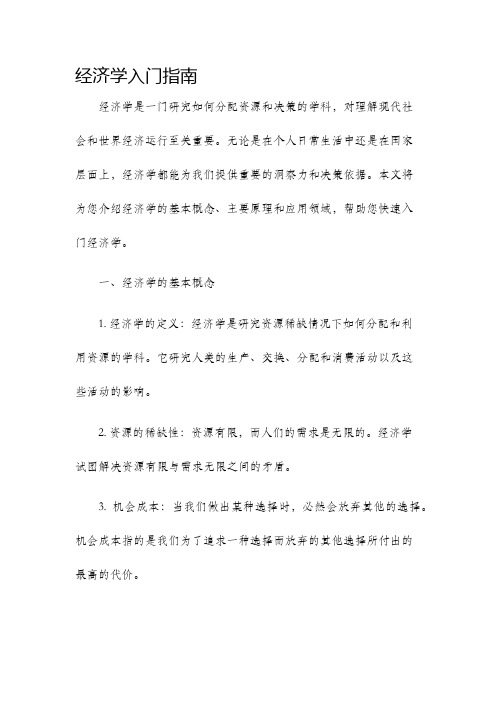
经济学入门指南经济学是一门研究如何分配资源和决策的学科,对理解现代社会和世界经济运行至关重要。
无论是在个人日常生活中还是在国家层面上,经济学都能为我们提供重要的洞察力和决策依据。
本文将为您介绍经济学的基本概念、主要原理和应用领域,帮助您快速入门经济学。
一、经济学的基本概念1. 经济学的定义:经济学是研究资源稀缺情况下如何分配和利用资源的学科。
它研究人类的生产、交换、分配和消费活动以及这些活动的影响。
2. 资源的稀缺性:资源有限,而人们的需求是无限的。
经济学试图解决资源有限与需求无限之间的矛盾。
3. 机会成本:当我们做出某种选择时,必然会放弃其他的选择。
机会成本指的是我们为了追求一种选择而放弃的其他选择所付出的最高的代价。
4. 供需关系:供需关系是经济学研究的核心概念之一。
供给是指生产者为市场提供货物和服务的数量,需求是指消费者愿意购买的货物和服务的数量。
供需关系决定了市场价格和数量的形成。
二、经济学的主要原理1. 边际效益递减原理:边际效益递减原理指的是随着某一项活动进行,每单位额外投入所产生的效益会逐渐减弱。
例如,当我们吃饭的时候,一开始吃一口饭可能会带来很大的满足感,但吃得越多,每一口的满足感就会递减。
2. 机会成本原理:机会成本原理强调了在做出选择时需要考虑放弃的其他选择所付出的成本。
我们不能只关注眼前的利益,还要同时考虑放弃其他选择所带来的损失。
3. 比较优势原理:比较优势原理指的是在资源配置中,各方应该按照各自的相对成本和效率选择最适合自己的产业或产品进行生产。
通过比较各方的相对成本,可以实现资源的最优配置。
4. 边际分析原理:边际分析原理是经济学中常用的工具,它通过比较每单位额外投入所产生的收益和成本,来帮助我们做出最优决策。
三、经济学的应用领域1. 微观经济学:微观经济学研究个体、企业和行业级别的经济行为,例如市场供需关系、价格形成机制等。
它可以帮助企业做出合理定价和生产决策,也能够帮助消费者理解市场和做出最优选择。
第一讲经济学是什么

失业、治理萧条的政策主张。
如果说全部经济学所作出的孜孜不倦的努力,都在于寻找 供给和需求的均衡,那么凯恩斯的独到之处就在于,他一反传
统的司空见惯之观点,着力于从需求入手去促成均衡,并且为
需求管理提供了令人信服且完备的理论体系,使经济学发生了 划时代的革命。
例如,私人资本的流动会引发什么?妇女的就业率攀升 会引发什么样的社会变化?企业的竞争为什么会从价格的竞 争扩展到技术创新的竞争上来?为什么在大多数情况下竞争 都是有限的?
Growing economic inequality means that we are moving money and assets from those who can spend it at the bottom to those who cannot spend it at the top.
有效需求是凯恩斯经济学的枢纽性概念。他用这一概
念去解释萧条,认为有效需求不足,是因为货币的购买能力不 足,并由此导致了萧条。
对于如何走出萧条,凯恩斯提出了 大致如下的政策性建议:
①由于萧条时期,人们对未来的预 期更多不确定性,信心不足,因而利率 政策通常效果甚微。因此,主要经济政 策是通过扩张性财政政策,维持足够的 总支出水平,其中特别是投资的增长, 推动经济增长,提升经济信心。
斯蒂格利茨教授在经济学的几乎所有主要分支中都作出 了极为重要的贡献:宏观经济学、 货币经济学、 公共财政和 公司金融、 贸易理论、 发展经济学和产业组织理论等等。
除了在专业领域的造诣之外,作为大学课堂上讲授经济 学理论的一线教师,斯蒂格利茨教授倡导引领学生理解现代 经济学的生机与活力,而不是枯燥无味的、与现实生活相隔 离的经济学理论。也就是说,我们应当充分理解现代经济学 原理 —既包括理解现代经济学家如何思考现实世界所必须的 原理,也包括理解当前经济问题所必需的原理。
第一讲 经济学的基本假设、问题和原理

2.经济学的逻辑
经济学家通过观察经济事件、利用统计分析和历史记录等 等来分析经济现象,在此基础上构建其理论架构,从而揭示出 经济现象的内涵。经济学在进行经济推理的过程中,应该注意 避免一些基本的逻辑错误。
第一、后此谬误:”前因”不一定导致“后果”
第二、条件谬误:请保持其它条件不变
第三、合成谬误:对局部成立不等于对整体也成立。
济问题的分析涉及伦理信条、价值判断和社会偏好,属于不能 被检验其因果关系的问题。
在经济学中,如何认识这两种方法的关系? 首先,经济学的研究方法是两种方法的结合。 其次,实证经济分析能够对我们在分析规范经济问题时持 有的价值观会产生影响。 再次,实证经济分析有助于我们选择恰当的政策来实现由 规范经济分析提出的目标。
第二、如何生产? 如何生产的问题包括谁来生产?使用什么资源,以及采用什 么技术来生产?等等。还要决定,在经济活动中,是允许较多的 污染?还是较少的污染?这一问题要受经济制度和政治制度,以 及生产者的技术偏好等因素的影响。 第三、为谁生产? 为谁生产就是一个生产成果,也就是一个国家的国民收入在 社会成员中如何分配的问题。这一问题与经济制度、政治制度和 社会价值观念都有一定的关系。 三、解决经济学三个基本问题的机制:市场经济、指令经济 和混合经济 上述三个问题从不同角度研究稀缺资源的配置决策。如何解 决这三个问题,从经济学的角度来看,实际上就是选择什么样的 稀缺资源的配置机制的问题。
▲经济学家从大家庭制度中看到了什么?
第二、经济学在局限条件下的研究ቤተ መጻሕፍቲ ባይዱ法将我们对人类 行为的研究放到了现实的基础上,有助于避免乌托邦式的、 脱离局限条件的研究。
▲ 在现代经济学热情看来,马克思“各尽所能,按需分 配”的共产主义社会就是一个典型的乌托邦。
《经济学》教程教案

《经济学》教程教案总体说明:教案的编写是为了帮助教师在教授《经济学》课程时有一份可参考的教学指导。
本教案旨在为教师提供教学内容、学习目标、教学方法和评估方式等方面的指导。
根据课程的具体内容和学生的实际情况,教师可以适当调整和修改教案的内容,以达到最佳的教学效果。
一、课程概述1. 课程名称:《经济学》2. 课程学分:3学分3. 授课对象:大一本科经济学专业学生4. 授课方式:面授二、课程目标1. 理论目标:- 了解经济学的基本概念和基本理论- 掌握供求关系、弹性、效用理论等经济学的基本原理- 理解市场经济的运行机制和市场失灵的原因- 掌握经济学在现实生活中的应用2. 能力目标:- 发展分析问题和解决问题的能力- 提高经济学思维和逻辑思维的能力- 培养团队合作和表达能力- 培养信息搜集和独立学习能力三、教学内容1. 第一讲:经济学导论- 经济学的定义及其研究对象- 经济学的基本假设和分析方法- 经济学的发展历程和重要学派2. 第二讲:供求关系与市场均衡- 需求曲线和供给曲线的绘制与解读- 供求关系的确定和市场价格的决定- 市场均衡的达成和调节机制3. 第三讲:市场失灵与政府干预- 市场失灵的定义和分类- 外部性和公共物品的经济学分析- 政府在市场失灵时的干预手段和效果评估4. 第四讲:消费者行为与效用理论- 消费者行为的基本假设和效用函数的假设- 边际效用和边际效用递减法则的解释- 消费者均衡和需求函数的推导5. 第五讲:生产与成本理论- 生产要素及其相互关系的分析- 生产函数和生产要素的边际产出和边际成本- 生产成本的计算和最优化选择6. 第六讲:市场结构与竞争策略- 市场结构的分类和特征- 垄断与垄断企业的行为策略分析- 垄断竞争和寡头垄断的经济效果比较四、教学方法1. 讲授法:通过课堂讲解介绍和阐释经济学的基本概念和理论,帮助学生理解知识点的内涵和逻辑关系。
2. 讨论法:组织学生进行小组讨论,提升学生的分析和解决问题的能力,并通过讨论引导学生思考和理解实际案例。
经济学概述
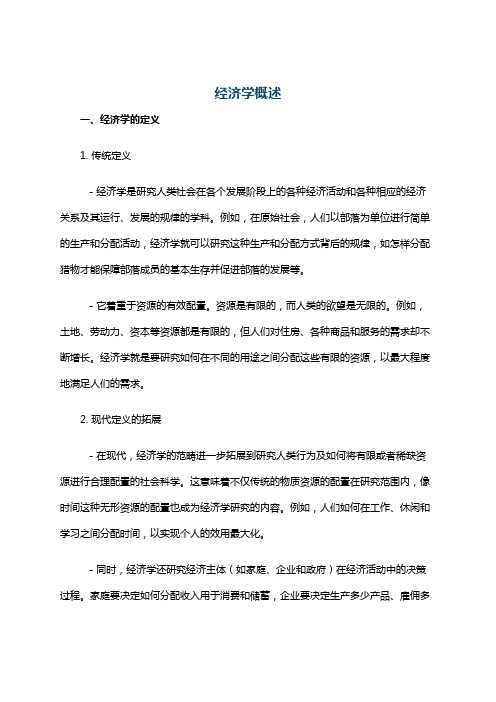
经济学概述一、经济学的定义1. 传统定义- 经济学是研究人类社会在各个发展阶段上的各种经济活动和各种相应的经济关系及其运行、发展的规律的学科。
例如,在原始社会,人们以部落为单位进行简单的生产和分配活动,经济学就可以研究这种生产和分配方式背后的规律,如怎样分配猎物才能保障部落成员的基本生存并促进部落的发展等。
- 它着重于资源的有效配置。
资源是有限的,而人类的欲望是无限的。
例如,土地、劳动力、资本等资源都是有限的,但人们对住房、各种商品和服务的需求却不断增长。
经济学就是要研究如何在不同的用途之间分配这些有限的资源,以最大程度地满足人们的需求。
2. 现代定义的拓展- 在现代,经济学的范畴进一步拓展到研究人类行为及如何将有限或者稀缺资源进行合理配置的社会科学。
这意味着不仅传统的物质资源的配置在研究范围内,像时间这种无形资源的配置也成为经济学研究的内容。
例如,人们如何在工作、休闲和学习之间分配时间,以实现个人的效用最大化。
- 同时,经济学还研究经济主体(如家庭、企业和政府)在经济活动中的决策过程。
家庭要决定如何分配收入用于消费和储蓄,企业要决定生产多少产品、雇佣多少劳动力等,政府要决定财政政策(如税收和支出水平)和货币政策(如货币供应量和利率)等,这些决策过程都是经济学研究的重要内容。
二、经济学的分类1. 微观经济学- 研究对象- 微观经济学主要研究单个经济单位(如家庭、企业)的经济行为。
例如,它研究家庭如何在不同商品之间进行选择以满足自身的效用,企业如何决定生产的产量和价格以实现利润最大化。
- 核心理论- 供求理论是微观经济学的核心理论之一。
在市场上,商品的价格是由供给和需求共同决定的。
当供给大于需求时,价格往往会下降;当需求大于供给时,价格往往会上升。
例如,在水果市场上,如果某一年苹果丰收(供给增加),而消费者对苹果的需求没有相应大幅增加,那么苹果的价格就会下降。
- 消费者理论也是微观经济学的重要组成部分。
经济学课件第一章-经济学基础知识

通过成本函数,可以分析不同产量下 的成本变化,从而制定合适的价格策 略,实现利润最大化。
收益函数
收益函数是描述在一定市场条件下,产品的销售收益 与产量之间关系的一种函数。
输入 标题
详细描述
收益函数表示在一定时期内,一定市场条件下,生产 者通过销售某一产量的产品所能获得的总收入。它反 映了市场需求与产量之间的经济关系。
总结词
总结词
通过收益函数,可以分析不同产量下的市场需求和收 益变化,从而制定合适的销售策略,实现利润最大化
。
详细描述
收益函数是用于研究市场需求和制定销售策略的重要 工具。
利润函数
总结词
详细描述
总结词
详细描述
利润函数是描述在一定市场 条件下,企业的总利润与产 量之间关系的一种函数。
利润函数表示在一定时期内 ,一定市场条件下,生产者 通过生产某一产量的产品所 能获得的净利润。它反映了 企业盈利与产量之间的经济
市场机制的优缺点
市场机制具有高效、灵活的优点,能够快速适应市场需求变化。但同时 ,市场机制也存在一些问题,如信息不对称、外部性等。
机会成本原理
机会成本原理概述
机会成本是指为了得到某种东西而放弃的下一个最佳选择。机会成本可以帮助我们评估 资源的价值,从而做出更有效的决策。
机会成本的应用
在经济学中,机会成本广泛应用于资源分配、生产决策等领域。例如,企业在决定生产 什么产品时,需要考虑生产这种产品的机会成本,即放弃生产其他产品的收益。
详细描述
通过生产函数,可以分析不同生产要素的组合对产出的影 响,从而优化资源配置,提高生产效率。
成本函数
总结词
成本函数是描述在一定产量下,生产 要素的投入成本与产量之间关系的一 种函数。
经济学基础大一知识点汇总
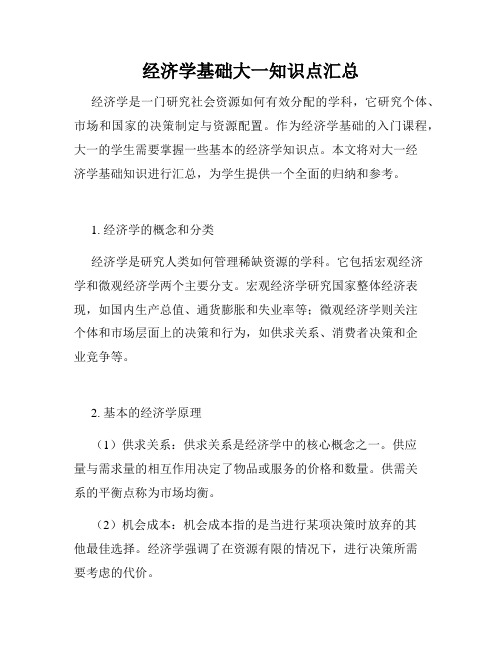
经济学基础大一知识点汇总经济学是一门研究社会资源如何有效分配的学科,它研究个体、市场和国家的决策制定与资源配置。
作为经济学基础的入门课程,大一的学生需要掌握一些基本的经济学知识点。
本文将对大一经济学基础知识进行汇总,为学生提供一个全面的归纳和参考。
1. 经济学的概念和分类经济学是研究人类如何管理稀缺资源的学科。
它包括宏观经济学和微观经济学两个主要分支。
宏观经济学研究国家整体经济表现,如国内生产总值、通货膨胀和失业率等;微观经济学则关注个体和市场层面上的决策和行为,如供求关系、消费者决策和企业竞争等。
2. 基本的经济学原理(1)供求关系:供求关系是经济学中的核心概念之一。
供应量与需求量的相互作用决定了物品或服务的价格和数量。
供需关系的平衡点称为市场均衡。
(2)机会成本:机会成本指的是当进行某项决策时放弃的其他最佳选择。
经济学强调了在资源有限的情况下,进行决策所需要考虑的代价。
(3)边际效益:边际效益是指当增加或减少一单位资源时,所得到的额外收益或损失。
人们应该根据边际效益来决定资源的最优配置。
(4)无效率和效率:经济学关注资源配置的效率问题。
无效率指的是在某种资源分配下,无法增加一个人或一个团体的福利而可以增加另一个人或团体福利的情况。
效率则指资源的最优利用,以使福利最大化。
3. 经济体制经济体制是指一个国家或地区资源配置和经济活动的组织方式。
主要的经济体制包括市场经济体制、计划经济体制和混合经济体制。
市场经济体制以市场为基础,通过供求关系来协调资源配置;计划经济体制则由政府集中管理和控制经济活动;混合经济体制则是市场和政府的结合。
4. 宏观经济学(1)国民经济核算:国民经济核算是宏观经济学的基础,它以国内生产总值(GDP)为核心指标,反映国家或地区的整体经济表现。
(2)通货膨胀和货币政策:通货膨胀是指物价总水平的不断上升。
货币政策是指央行通过控制货币供给来调控经济活动和稳定物价水平。
(3)失业和就业:失业率是反映某个国家或地区劳动力市场状况的指标。
01第一讲 经济学基础:经济学十大原理

古典经济学的两大基石
1、资源的稀缺性。稀缺性是指社会拥有的资源是 、资源的稀缺性。 有限的, 有限的,因此不能产生人们希望拥有的所有物品与 劳务。 劳务。 2、理性人假设。西方经济学家指出,所谓的“理 、理性人假设。西方经济学家指出,所谓的“ 性人” 性人”的假设是对在经济社会中从事经济活动的所 有人的基本特征的一个一般性的抽象。 有人的基本特征的一个一般性的抽象。这个被抽象 出来的基本特征就是: 出来的基本特征就是:每一个从事经济活动的人都 是利己的。也可以说, 是利己的。也可以说,每一个从事经济活动的人所 采取的经济行为都是力图以自己的最小经济代价去 获得自己的最大经济利益。西方经济学家认为, 获得自己的最大经济利益。西方经济学家认为,在 任何经济活动中,只有这样的人才是“ 任何经济活动中,只有这样的人才是“合乎理性的 否则,就是非理性的人。 人”,否则,就是非理性的人。
9
原理三:理性人考虑边际量 原理三:
生活中的许多决策很少是黑与白的选择, 生活中的许多决策很少是黑与白的选择,而 往往涉及到灰色阴影。在许多情况下, 往往涉及到灰色阴影。在许多情况下,人们 通过考虑边际量来做出最优决策。 通过考虑边际量来做出最优决策。 经济学家用边际变动这个术语来描述对现有 行动计划的微小增量调整。记住“边际” 行动计划的微小增量调整。记住“边际”指 边缘” 因此, “边缘”,因此,边际变动是围绕你所做的 事的边缘的调整。 事的边缘的调整。 在许多情况下, 在许多情况下,人们通过考虑边际量来做出 最优决策。 最优决策。
企业组织与市场分析
经济学基础: 第一讲 经济学基础:经济学十大原理
1
认识经济学
经济学是一门研究人类行为及如何将有限或 者稀缺资源进行合理配置的社会科学。 者稀缺资源进行合理配置的社会科学。 经济学的英语Economics是由希腊文 是由希腊文οἶκος 经济学的英语 是由希腊文 [oikos]而来,意思是家庭、家族、财产权 而来, 而来 意思是家庭、家族、 (family, household, estate)以及 )以及νόµος [nomos], 或法律(custom, law)组成,从逐 或法律( )组成, 字上来看是指家族管理( 字上来看是指家族管理(household management)或是政府的管理。 )或是政府的管理。
第一讲 经济学的基本假设、问题和原理
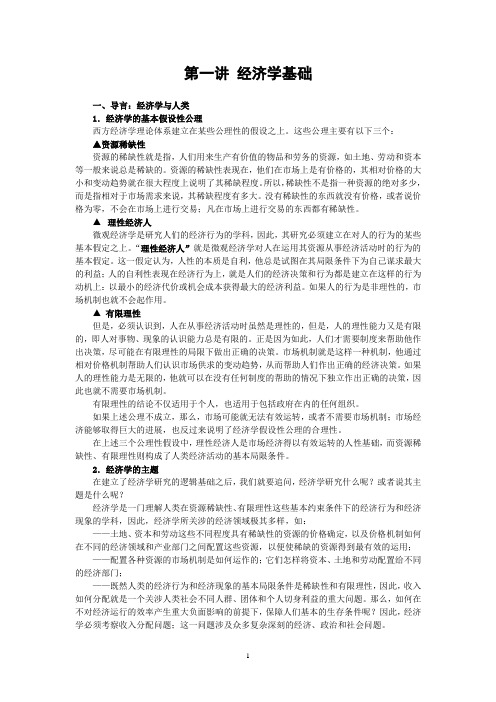
第一讲经济学基础一、导言:经济学与人类1.经济学的基本假设性公理西方经济学理论体系建立在某些公理性的假设之上。
这些公理主要有以下三个:▲资源稀缺性资源的稀缺性就是指,人们用来生产有价值的物品和劳务的资源,如土地、劳动和资本等一般来说总是稀缺的。
资源的稀缺性表现在,他们在市场上是有价格的,其相对价格的大小和变动趋势就在很大程度上说明了其稀缺程度。
所以,稀缺性不是指一种资源的绝对多少,而是指相对于市场需求来说,其稀缺程度有多大。
没有稀缺性的东西就没有价格,或者说价格为零,不会在市场上进行交易;凡在市场上进行交易的东西都有稀缺性。
▲理性经济人微观经济学是研究人们的经济行为的学科,因此,其研究必须建立在对人的行为的某些基本假定之上。
“理性经济人”就是微观经济学对人在运用其资源从事经济活动时的行为的基本假定。
这一假定认为,人性的本质是自利,他总是试图在其局限条件下为自己谋求最大的利益;人的自利性表现在经济行为上,就是人们的经济决策和行为都是建立在这样的行为动机上:以最小的经济代价或机会成本获得最大的经济利益。
如果人的行为是非理性的,市场机制也就不会起作用。
▲有限理性但是,必须认识到,人在从事经济活动时虽然是理性的,但是,人的理性能力又是有限的,即人对事物、现象的认识能力总是有限的。
正是因为如此,人们才需要制度来帮助他作出决策,尽可能在有限理性的局限下做出正确的决策。
市场机制就是这样一种机制,他通过相对价格机制帮助人们认识市场供求的变动趋势,从而帮助人们作出正确的经济决策。
如果人的理性能力是无限的,他就可以在没有任何制度的帮助的情况下独立作出正确的决策,因此也就不需要市场机制。
有限理性的结论不仅适用于个人,也适用于包括政府在内的任何组织。
如果上述公理不成立,那么,市场可能就无法有效运转,或者不需要市场机制;市场经济能够取得巨大的进展,也反过来说明了经济学假设性公理的合理性。
在上述三个公理性假设中,理性经济人是市场经济得以有效运转的人性基础,而资源稀缺性、有限理性则构成了人类经济活动的基本局限条件。
经济学基本知识概述

经济学基本知识概述
第一部分:经济学的定义与目的
经济学是一门研究资源分配和决策制定的学科。
它涉及个人、家庭、企业和国家之间生产、消费和分配的行为。
第二部分:经济体系
经济体系是指一个国家或地区内的经济组织结构和运作方式。
主要的经济体系有市场经济、计划经济和混合经济。
第三部分:供求关系和市场
供求关系是指商品和服务在市场上的价格和数量之间的关系。
市场机制通过供求关系来决定价格和资源分配。
第四部分:经济增长和发展
经济增长是指国民生产总值(GDP)的增加。
经济发展则涉及经济结构的改革和社会的进步。
第五部分:货币和通货膨胀
货币是用作交换媒介和价值存储的一种资产。
通货膨胀是指物价普遍上升导致货币购买力下降的现象。
第六部分:国际贸易和全球化
国际贸易是国家之间交换货物和服务的过程。
全球化则涉及全球经济的互联互通和相互依赖。
第七部分:市场失灵和政府干预
市场失灵是指市场机制无法有效分配资源导致经济效率下降的情况。
政府可以通过干预来修复市场失灵。
第八部分:经济政策和经济周期
经济政策是指政府为了影响经济发展而采取的措施。
经济周期是指经济增长和衰退交替出现的周期性现象。
以上是对经济学基本知识的概述,希望对您有所帮助。
经济学的定义与十大原理

五、经济学的分类
1. 微观经济学与宏观经济学
2. 实证经济学和规范经济
绪言
实证经济学和规范经济
实证经济学
在一定的假定前提下分析和预测行为后果 的一种方法,力求说明是什么。
具有客观性, 结论可以被检验,具有自然 科学的性质。
例如: 粮食提价引起粮食增产还 是减产?
2020/3/14
26
绪言
原理四 人们会对激励作出反应--上有 政策下有对策
经济学十大原理
原理五 贸易能使每个人状况更好 比较优势的发挥
原理六 市场通常是组织经济活动的一种 好方法 一只看不见的手
原理七 政府有时可以改善市场结果 外部性,公共物品
经济学十大原理
原理八 一国的生活水平取决于它生产物 品与劳务的能力
原理九 当政府发行了过多货币时物价上 升
2020/3/14
14
政府面临的各种宏观经济问题
➢ 总需求与总供给的平衡 ➢ 财政平衡 ➢ 劳动力平衡 ➢ 货币平衡 ➢ 外汇平衡 ➢ 通货膨胀与就业 ➢ 经济增长 ➢ 经济波动
绪言
宏观经济学研究的问题
? 本
2020/3/14
1. 一国的资源是否被充分地利用
最重要的资源是人力资源和资
代表参数:失业率、利率
CPI=—————————————
一篮子物品与劳务 x 基期价格
绪言
七、经济学研究的范围
1. 经济活动的主体
在经济活动中 我们通常说要处理好三 者之间的关系:国家、集体、个人,这 说明经济活动通常有三个主体:
国家———政府 集体———企业 个人———家庭
2020/3/14
32
duction
经济活动框图
经济学基础 PPT

值的商品,并把它们在不同的人之间分配;
2020/4/5
9/31
经济学 基础
二、经济学是研究人们选择行为的理论
你今天到目前为止了做了哪些选择行为?
经 济
为什么要进行选择? --稀缺性:社会资源的有限性
学 的
主
谁来选择? ——决策者:个人、厂商、政府和其他组织 如何选择?
是文科的基础。如果说民主可以治国,科学可以强国,
那么,经济才能富国。
• 经济学是经邦济世,经国济民的科学。
2020/4/5
6/31
经济学
基础 为什么会有经济学呢?
• 人类经济问题的根源就在于资源的有限性。
• 一方面,相对于人类无止境的生产,或者说是无穷 的欲望而言,我们人类所能拥有的资源太少了;
• 另一方面,由于自然或社会的原因,这些有限的资 源还往往得不到充分的利用。
2020/4/5
14/31
经济学
基础 稀缺与效率——经济学的双重主题
稀缺 (scarcity)
选择 (Choice):
机会成本
(opportunity cost)
人类生存需要 消耗资源
有限的资源如 何利用
资源利用有 效性
2020/4/5
15/31
经济学 基础
三、经济学的思维方式
经济学的思维方式是一种方法,而不是一套 结论。
斥着大量的统计数字和专业术语。其实,经济学是最
具人文关怀的科学,它关怀的是人最基本的生存和发
展的需求。人生在世,需要衣、食、住、行等各种商
品和服务,除此之外,还有安全、爱、尊重以及自我
实现等方面的需求。这些需求和欲望是无限的,而人
经济基础第一章 经济学概述

边际变动的经典解释
• 生活中的很多决策很少是黑与白的选择, 而往往涉及到一些其他利益或影响。人们 通过考虑边际量来做出最优决策。
• 当考试临近时,你的决策不是放弃考试或 一天学习24小时之间的选择,而是是否要 多花一小时复习功课而不看电视。
编辑ppt
原理四:激励反应原理
由于人们通YO过UR比SU较BT成ITL本E G与OE收S 益HER做E 出 决策,所以,当成本或收益变动时, 人们的行为也会改变。这就是说, 人们会对激励做出反应。
•通货膨胀是指一国经济中物价水平的持续 上升。通俗地Y说OU,R SUBTITLE GOES HERE
编辑ppt
• 最惊人的通货膨胀:1921年1月,德国一 份日报价格为0.3马克。不到两年之后, 1922年11月,一份同样的报纸价格为 7000万马克。经济中所有其他价格都以 类似的程度上升。
编辑ppt
编辑ppt
案例
编辑ppt
分析
编辑ppt
小结
• 以上4个原理讨论了人们如何做出决策。 • 以下3个原理是关于人们如何互相交易
的。
编辑ppt
原理五:比较优势原理/交换(贸易)原理
YOUR SUBTITLE GOES HERE
编辑ppt
编辑ppt
• 核心内容:两利取重、两害取轻
编辑ppt
原理六:“看不见的手”原理
述经济理论
编辑ppt
第四,代数表达 法,或称模型法。 用函数关系来表 述经济理论
实证分析方法:实证的分析工具
(1)均衡分析
在物理学中,均衡表示:同一物体同时受到几个方
向不同的外力作用而合力为零时,该物体所处的静
止或匀速运动的状态。英国经济学家马歇尔把这一
经济学基础大一知识点归纳
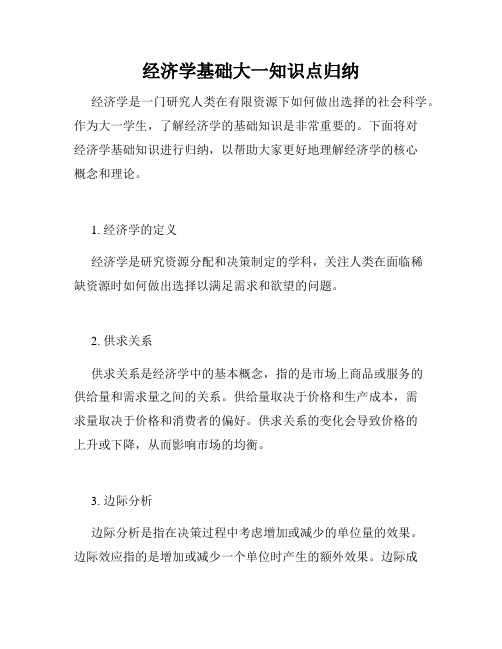
经济学基础大一知识点归纳经济学是一门研究人类在有限资源下如何做出选择的社会科学。
作为大一学生,了解经济学的基础知识是非常重要的。
下面将对经济学基础知识进行归纳,以帮助大家更好地理解经济学的核心概念和理论。
1. 经济学的定义经济学是研究资源分配和决策制定的学科,关注人类在面临稀缺资源时如何做出选择以满足需求和欲望的问题。
2. 供求关系供求关系是经济学中的基本概念,指的是市场上商品或服务的供给量和需求量之间的关系。
供给量取决于价格和生产成本,需求量取决于价格和消费者的偏好。
供求关系的变化会导致价格的上升或下降,从而影响市场的均衡。
3. 边际分析边际分析是指在决策过程中考虑增加或减少的单位量的效果。
边际效应指的是增加或减少一个单位时产生的额外效果。
边际成本指的是生产或消费一个额外单位的成本。
边际分析可以帮助我们做出最优决策。
4. 成本与效益成本与效益是经济学中重要的概念。
成本指的是为达成某种目标而放弃的最佳选择的价值,效益指的是达成目标后带来的满足感或经济增益。
在决策过程中,我们需要权衡成本与效益,以实现最优解。
5. 机会成本机会成本是指为了选择某种行动而放弃的最佳替代选择的成本。
在资源有限的情况下,我们不仅需要考虑实际支付的成本,还要考虑放弃其他选择所失去的机会成本。
6. 分工与比较优势分工与比较优势是由亚当·斯密提出的经济原理。
分工指的是将生产过程划分成不同的环节,由专门的人负责不同的环节,并通过交换来获取其他商品和服务。
比较优势指的是一个国家或个人在生产某种商品或服务上相对于其他国家或个人具有更低的机会成本。
7. 市场结构市场结构指的是市场中的买卖双方和参与者的数量、规模和能力。
常见的市场结构包括完全竞争市场、垄断市场、寡头垄断市场等。
不同的市场结构会影响价格和资源的分配。
8. 外部性和公共物品外部性是指生产或消费过程对除参与者以外的第三方产生的影响。
外部性可以是正面的(正外部性)或负面的(负外部性)。
经济学教案第一课

经济学教案第一课引言:经济学是一门研究资源配置和决策制定的学科,是理解市场运作和社会经济发展的重要工具。
本教案旨在介绍经济学的基本概念、原理和方法,帮助学生建立对经济学的理论框架和分析思维。
一、经济学的定义和目标1. 定义:经济学是研究人类活动中资源的生产、分配和利用的学科。
2. 目标:经济学的主要目标是实现资源的最优配置,使社会福利最大化。
二、经济学的基本概念1. 供给和需求:供给是指市场上生产者愿意出售的商品或服务的数量,需求是指消费者愿意购买的商品或服务的数量。
2. 价格机制:价格是市场供求关系的反映,通过价格的变动调节供求平衡。
3. 成本和效益:成本是为生产商品或服务所付出的资源和劳动的代价,效益是指购买商品或服务所获得的满足感。
4. 边际效益:边际效益是指增加或减少一单位资源或产品所带来的额外效益或损失。
三、经济学的理论基础1. 均衡理论:均衡理论是经济学的核心概念,包括供求均衡、成本效益均衡等。
2. 边际效用理论:边际效用理论是经济学中的重要理论基础,解释了人们为什么会在边际效益相等时做出最佳的决策。
3. 战略行为理论:战略行为理论研究个体在市场中的决策和行为,涉及博弈论等内容。
四、经济学的方法论1. 归纳法和演绎法:经济学既运用归纳法总结历史数据和实证研究,也借助演绎法构建理论模型和进行预测分析。
2. 定量分析和定性分析:经济学采用定量分析方法进行数量化的研究,也运用定性分析方法进行描述性和解释性的研究。
3. 实证研究和规范研究:实证研究基于数据和事实,分析经济现象的原因和影响;规范研究则提出政策建议和制定经济政策。
五、经济学的应用领域1. 宏观经济学:宏观经济学研究整个经济体的总体运行和宏观经济政策。
2. 微观经济学:微观经济学研究个体经济主体在市场中的决策和行为,涉及价格理论、产业经济学等。
3. 产业经济学:产业经济学研究不同产业的市场结构和竞争行为,以及政府对产业的干预和规制。
- 1、下载文档前请自行甄别文档内容的完整性,平台不提供额外的编辑、内容补充、找答案等附加服务。
- 2、"仅部分预览"的文档,不可在线预览部分如存在完整性等问题,可反馈申请退款(可完整预览的文档不适用该条件!)。
- 3、如文档侵犯您的权益,请联系客服反馈,我们会尽快为您处理(人工客服工作时间:9:00-18:30)。
“许多实行家自以为不受任何学理的影响,却往往当了某 个已故经济学的奴隶”
“The ideas of economists and political philosophers, both when they are right and when they are wrong, are more powerful than is commonly understood. Indeed, the world is ruled by little else. Practical men, who believe themselves to be quite exempt from intellectual influences, are usually the slaves of some defunct economists.”
20
经济学的三类问题
1. 人们如何作出决策 How People Make Decisions
2. 人们如何相互作用 How People Interact
3. 整体经济如何运行 How the Economy as a Whole Works
21
经济学的十个原理
人们如何作出决策
How People Make Decisions
• 训练经济学直觉 To gain economic intuition
13
经济学三个层次的特点
经济学原理不用公式而用图表(“curveshifting economics”)
入门课 三个主要目的
中级经济学用一些数学和统计
较为严格的数学推理 较为系统的经验实证分析
高级经济学用很多数学(“Greek-letter economics”)
4. 人们会对激励作出反应。 People respond to incentives.
22
经济学的十个原理
人们如何相互作用 How People Interact
5. 贸易能使人人收益。 Trade can make everyone better off.
6. 市场通常是组织经济活动的好方式。 Markets are usually a good way to organize economic activity.
前沿的学术研究
14
常问的问题
“我的数学基础好,可以直接学中级微观经济学和中级 宏观经济学吗?”
“我已经阅读了不少经济学书籍,包括一些名著,可以 不用学经济学原理了吗?”
“我将来要学金融学,为什么要学经济学? ” “我将来要学工商管理,为什么要学经济学? ” “我的专业是社会学、政治学、新闻与传媒、法律,学
8
经济、经济学和经济学家
经济学(Economics)
基本观察:资源的稀缺性scarcity of resources 研究社会对稀缺资源的管理,从而研究
• 人们的经济行为(人们如何做决策) • 社会的经济现象(人们决策的相互作用)
经济学在当代中国的特殊位置
对政府的影响 对企业的影响 对社会的影响
1. 人们面临得失交换(权衡取舍)。 People face tradeoffs.
2. 某物的成本是为此所放弃的东西。 The cost of something is what you give up to get it.
3. 理性人思考边际量。 Rational people think at the margin.
12
2
经济学原理的课程目的 Course Objectives
• 领会现代经济学的基本思想、概念与分析方法 To learn the basic ideas, concepts, and analytical methods of economics
• 培养对现实世界经济行为与经济现象的观察能力 To acquire the ability of making observations of economic behavior and phenomena in the real world
• 没有想到的原因(unexpected reasons)
• 非有意的后果(unintended consequences)
• 无关紧要的因素(irrelevant factors)
• 出乎预料的办法(surprising mec的力量 John Maynard Keynes on
微观经济学Micro 宏观经济学Macro 计量经济学
Econometrics
金融学Finance 产业组织Industrial
Organization 劳动经济学Labor 公共财政Public
Finance
国际经济学 International
发展经济学Development 比较经济学Comparative 政治经济学Political
11
怎样学习经济学? How to Study Economics?
学习经济学的三个层次 Three levels of learning economics
初级经济学(经济学原理)The Introductory level( 钱颖一教授)
中级经济学 The Intermediate level(李稻葵教授) 高级经济学 The Advanced level(白重恩教授)
Economy 法律和经济学Law and
Economics 经济史Economic
History
5
金融学是经济学科的一部分
什么是金融学(Finance)
“微观金融”(finance)
公司金融(corporate finance)(又称公司财务) 资产定价(asset pricing)
16
一种新的思维方式 A New Way of Thinking
经济学是这样一门学科——可以凭少量 的知识去理解广泛的现象。
Economics is a subject in which a little knowledge goes a long way.
17
一种新的思维方式 A New Way of Thinking
Science
经济学是一门有趣、有用的社会科学。 Economics is an interesting and useful subject in social sciences
它的主题是社会的——人们的选择如何引导他们的生 活,以及他们如何相互影响。 Its subject matter is society – how people choose to lead their lives and how they interact with one another.
19
凯恩斯:经济学家的素质
John Maynard Keynes on Economists
“ The master-economist must possess a rare combination of gifts. He must be mathematician, historian, statesman, philosopher—in some degree. He must understand symbols and speak in words. He must contemplate the particular in terms of the general, and touch abstract and concrete in the same flight of thought. He must study the present in the light of the past for the purpose of the future. No part of man’s nature or his institutions must lie entirely outside his regard. He must be purposeful and disinterested in a simultaneous mood; as aloof and incorruptible as an artist, yet sometimes as near the earth as a politician.”
习经济学原理有用吗?”
15
“经济学原理”课可以改变人生
“在我当学生的20年中,最令我兴奋的课程是我 在上大学一年级时所选的连续两个学期的经济 学原理。可以毫不夸张地说,这门课改变了我 的一生。” ——曼昆《经济学原理》序言
“During my 20 year career as a student, the course that excited me most was the twosemester sequence on the principles of economics that I took during my freshman year in college. It is no exaggeration to say that it changed my life.”
管理信息系统Management Information System:网上拍卖运用博弈论、信息产品定价 运用价格理论
市场营销学Marketing:定价策略得益于信息 经济学和博弈论
人力资源管理学Human Resource Management :大量运用组织经济学和激励理论的分析方法
“宏观金融”
货币银行(money and banking) 国际金融 (international finance) 开放经济的宏观经济学(open economy
macroeconomics)
6
1
